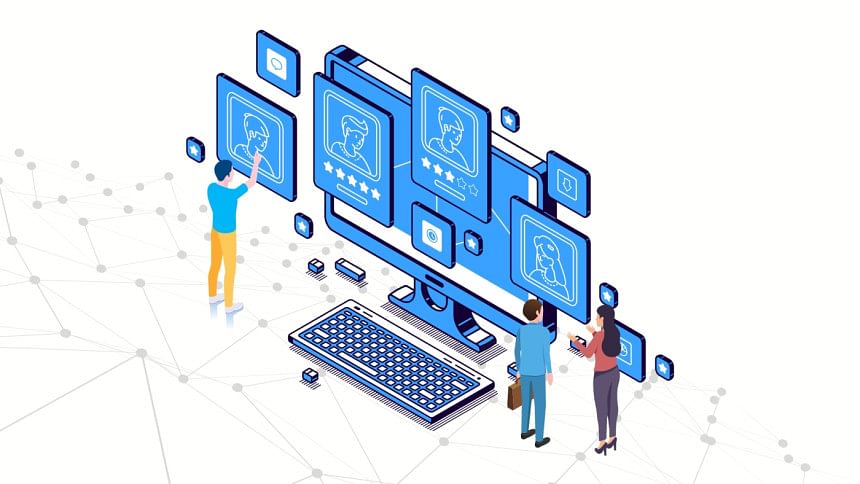How digital transformation is reshaping everything we know

A decade ago, Westerman talked about some digital transformative technologies, like artificial intelligence (AI), cloud computing, big data analytics, blockchain, and the Internet of Things (IoT). He also mentioned that adopting these technologies eventually will become quite significant. Most significantly, this adaptation of technologies can happen in various areas of regular lives, like business, government, healthcare, education, and regular life.
This adaptation of transformative technologies refers to digital transformation. Indeed, digital transformation has some challenges as well like cybersecurity risks, data privacy concerns, resistance to change, and scrutinizing skill gaps among the employees. However, Henriette and colleagues mentioned in 2016 that, before introducing the process of digital transformation, organisations must have thoughtfulness of investment in cybersecurity measures, employee training, and change management strategies.
Digital transformation has certain usefulness and benefits. Generally, efficiency and productivity get enhanced. In the last decade, Besson and Rowe talked a lot about improving operational efficiency by automating tasks as well as omitting the repetitive tasks. Moreover, Bughin with his colleagues also discussed in 2018 about increasing productivity, predicting trends along with minimising wastes of various sorts by integrating AI analytics while optimising the resources.
On the other hand, Vial discussed enabling cloud-based systems in 2019. Digital transformation also facilitates data-driven decision-making, by implementing predictive analytics mentioned by Raghupathi & Raghupathi in 2014 and assists to diagnose in the healthcare system, by implementing big data analytics discussed by McAfee & Brynjolfsson in 2012. It is also useful in real-time monitoring that can be introduced by using large datasets that drive towards strategic decisions revealed by some of the colleagues of Gomber and most significantly, reporting of risk management and compliance issues can be integrated and published as well.
For improved customer experience, AI and data analytics need to be personalised digitally to tailor products and customer needs that is scrutinized by Chaffey in 2021. Lemon & Verhoef once discussed in 2016 about the omnichannel communication platforms that is enhanced by customer engagement, ensuring seamless interactions across digital and physical touchpoints. Hence, Wirtz and colleagues brought out the topic of automated customer support services like chatbots, response times, satisfaction levels, etc. back in 2018. Interestingly, most of these are implemented in various fields and are working pretty well.
Digital transformation also reduces cost as well as creates new dimensions of growth of revenue. In the area of cloud computing and related digital tools, reduction of physical infrastructural requirements are observed, which has been discussed long back by Marston in 2011. Furthermore, Davenport and Ronanki said that the integration of AI-driven decision-making errors can be implemented to improve financial planning and boosting profitability. Kotler and friends tried to disclose the aspect of digital marketing strategies, including SEO, social media, and targeted advertising, to enhance reach and revenue generation as well.
Digital transformation enhances innovation and competitive advantage of any organization by encouraging innovation, business models, products and services discussed by Sebastian and colleagues in 2017. Fitzgerald and colleagues talked about leveraging the emerging technologies to gain a competitive edge by staying ahead of industry trends and customer demands in 2014. Also, Nambisan with friends also talked about collaboration tools and digital ecosystems encouraging cross-industry partnerships and knowledge sharing.
Digital transformation has given a shift of paradigm to various industries in the country, leading towards efficiency, facilitating innovation, and customer satisfaction while promoting sustainability. Organisations embracing digital transformation strategically are positioned to thrive in the digital age. However, a well-planned approach addressing security, ethical concerns, and workforce adaptation is necessary for sustainability as well.
The current time demands that digital transformation exists as a fundamental requirement rather than an elective possibility. For successful navigation of the faced challenges in businesses need to be identified and for making dual investments in technology together with building adaptable environments that eventually promote security and knowledge acquisition. All sectors including business entities and governmental bodies and individual users need to form an interconnected system that enables technology to work for human welfare instead of working against it.
Dr. Tarnima Warda Andalib is an assistant professor at BRAC University. Dauwood Ibrahim Hassan is a marketing and CIM graduate with a strong passion for digital marketing, content creation, and data analysis.

 For all latest news, follow The Daily Star's Google News channel.
For all latest news, follow The Daily Star's Google News channel. 



Comments